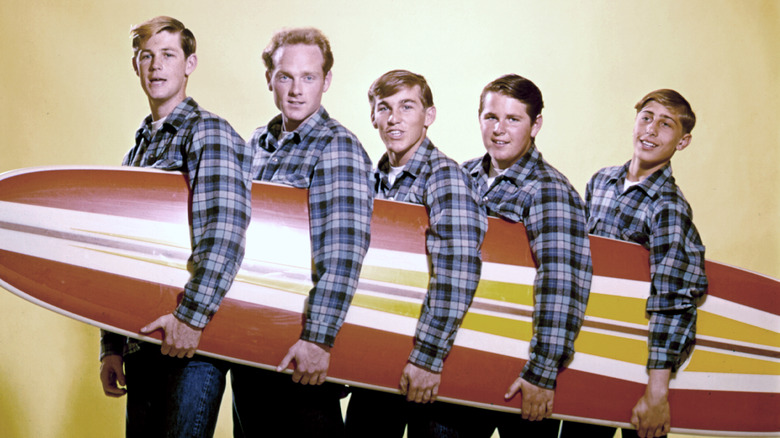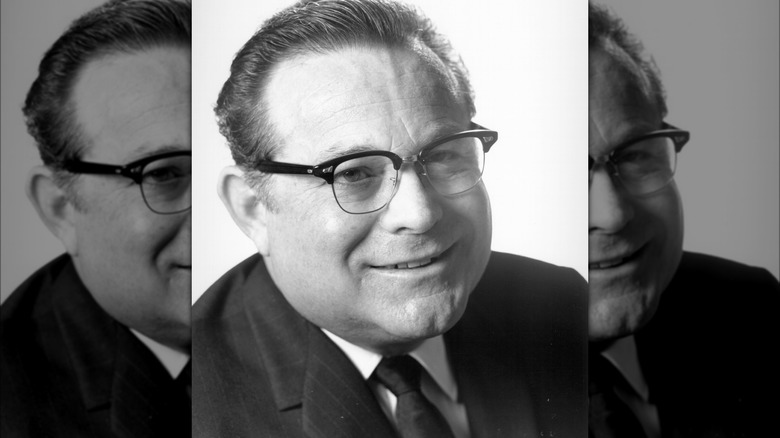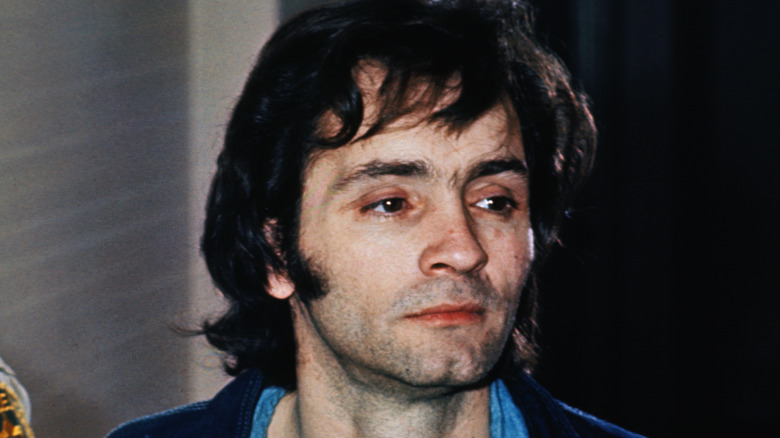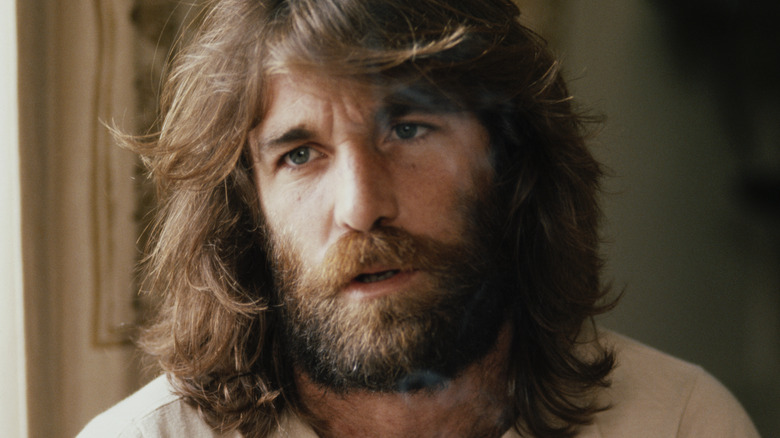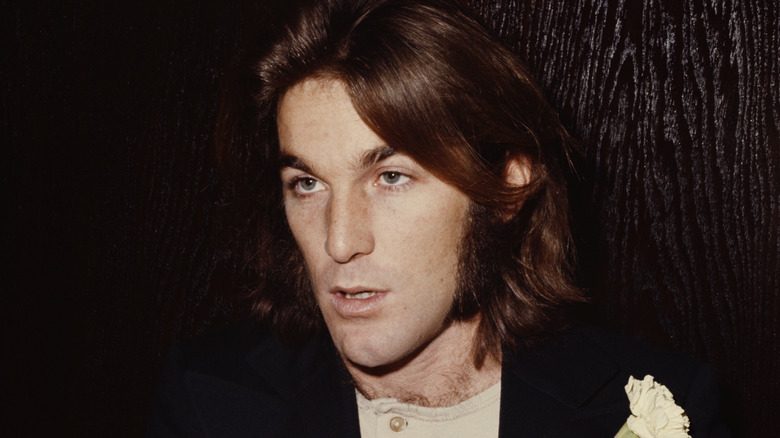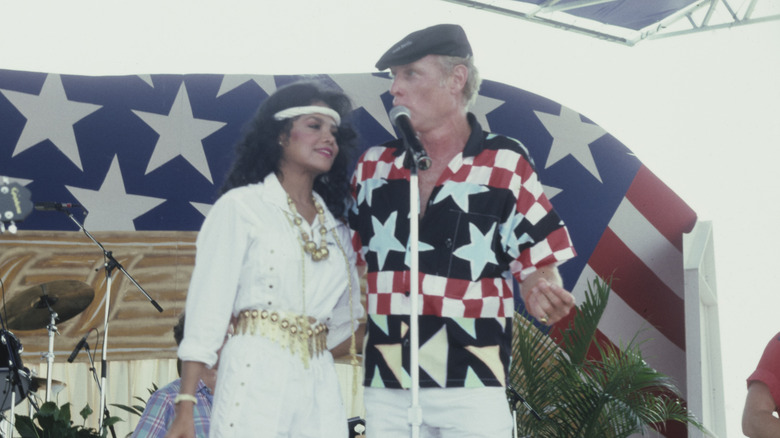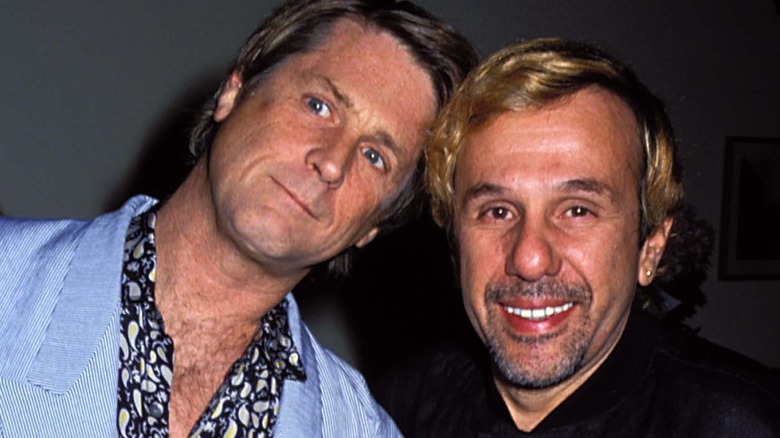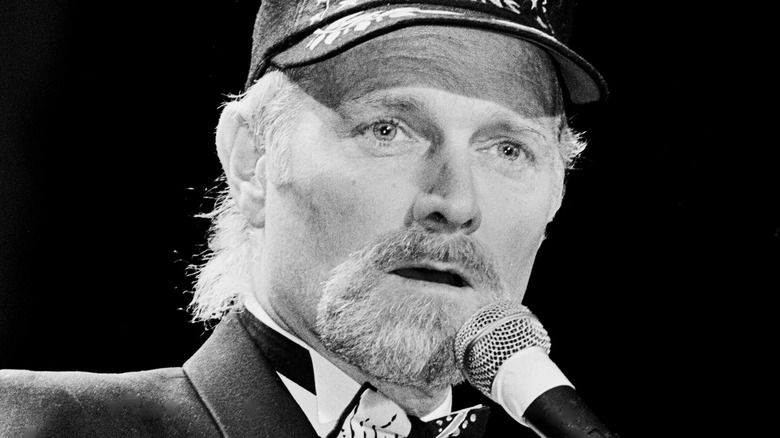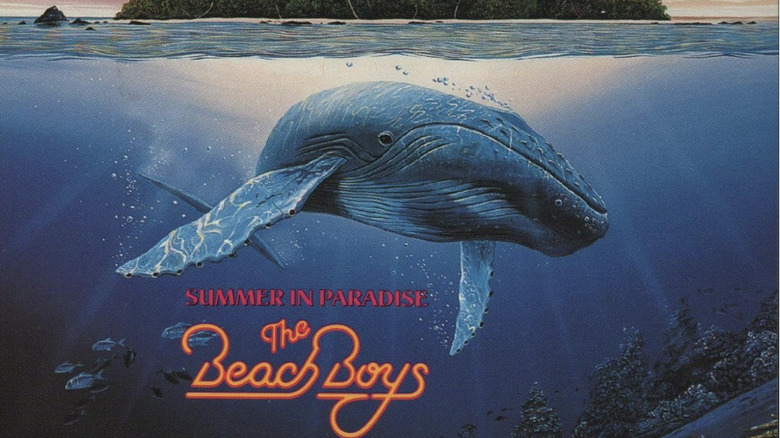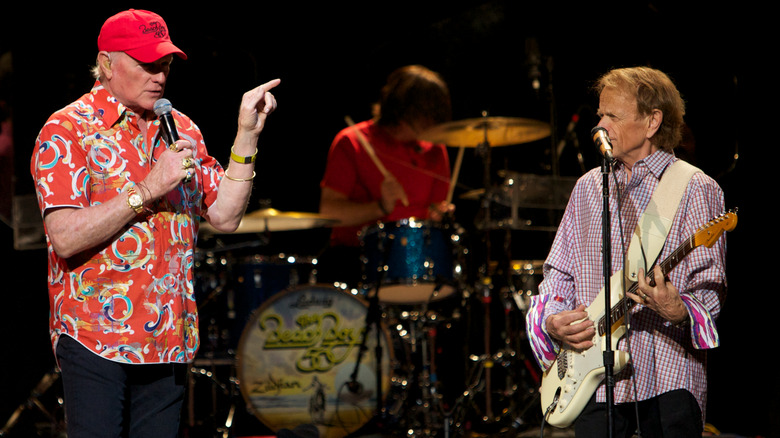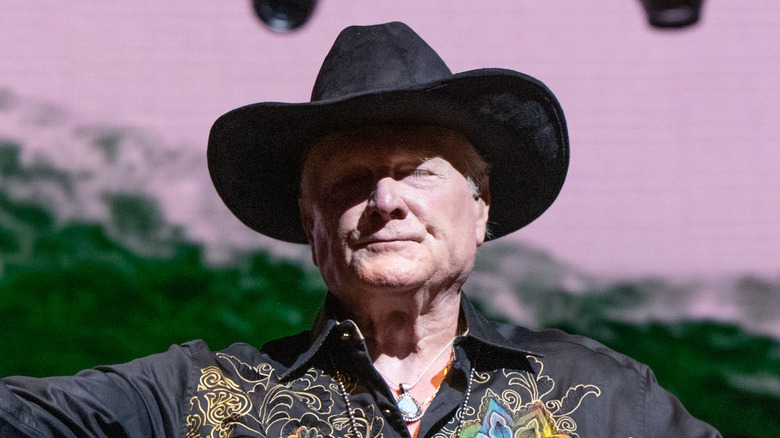The Messed Up Reality Of The Beach Boys
The Beach Boys made some of the sunniest, catchiest, most fun-loving, and instantly nostalgic music ever in the 1960s, and then took rock to new heights, all the while dealing with pain, trauma, health issues, death, and internal disputes. Initially made up primarily of Wilson siblings Brian, Dennis, and Carl, and their cousin, Mike Love, the Beach Boys exploited, mythologized, and defined the California vibe for the entire planet. Songs about surfing, cars, and dating served as the soundtrack of the lives of teenage Baby Boomers. Then, under the direction of Brian Wilson, the Beach Boys took an experimental turn, and the frivolous but well-crafted pop of "Fun, Fun, Fun" and "Help Me, Rhonda" gave way to "Pet Sounds" and "Good Vibrations."
As the band's members matured, so did its sound, and the music reflected the tumult they all faced. Over the decades, the Beach Boys story grew harrowing, dramatic, and horrible, peppered with lawsuits, tragedy, violence, and terrible decisions. Catch a wave and take a ride on the surprisingly and undeniably dark history of the Beach Boys.
The brief and dark influence of Murry Wilson
When Hawthorne, California, brothers Brian, Dennis, and Carl Wilson formed a rock n' roll band in 1961, their father, mildly successful songwriter Murry Wilson, tried to make his music industry dreams come true by taking it on himself to manage the group. Tentatively called the Pendletones, among other names, the group settled on the Beach Boys, offered by one of the music industry professionals introduced to them by their father.
Murry Wilson motivated his sons through intimidation and abuse, routinely striking Brian and taking out his glass eye as a power move. He attempted to control their every move on tour and make all of their musical decisions, and by 1964, his meddling resulted in his termination by his own sons. During recording sessions for "Fun, Fun, Fun," Murry persistently critiqued Brian Wilson's production choices while also resorting to put-downs, name-calling, and proclaiming himself to be the only talented member of the Wilson family. After Brian told Murry he was wrong about a bass line sound, Murry erupted, and Brian responded by throwing him out of the studio and forcing an end to his day-to-day association with the band.
However, Murry Wilson still retained some control of the band's catalog, and in 1969 he sold the rights to Irving Music. Twenty years later, Brian Wilson sued Irving for $50 million, alleging that his father faked his signature in 1969 rather than secure his approval, and as such, he and his bandmates received a poor deal.
The Beach Boys were close with Charles Manson
In 1968, Dennis Wilson picked up two female hitchhikers, who told the Beach Boys drummer all about the spiritual development they'd accomplished since meeting a charismatic figure named Charles Manson. When Wilson was out of town, the women moved into his home ... as did Manson. Wilson called Manson "The Wizard" and implored the other Beach Boys to join Manson's tight-knit "Family" of enlightened followers.
Manson angrily confronted Mike Love and Bruce Johnston when they refused to participate in a nude LSD-ingestion session, while Wilson got heavily involved with the Family, spending thousands on their food and gonorrhea treatments. Charles Manson's songs were performed by many famous bands, and at the drummer's encouragement, the Beach Boys recorded Manson's "Cease to Exist." Retitled "Never Learn Not to Love," the band used it as the B-side of the single "Bluebirds Over the Mountain" and played it on "The Mike Douglas Show." Manson was incensed when Wilson changed the title and some of the lyrics, and also credited himself as the only songwriter. Manson left threatening notes to Wilson, and they fell out completely.
The next year, in 1969, the Manson Family killed five people at a house party in Los Angeles. The home's previous resident was Terry Melcher, a record producer introduced to Manson by Wilson, and who thought about working with the amateur musician and cult leader.
The troubled life and sad death of Dennis Wilson
Founding Beach Boys member Dennis Wilson didn't play drums on all that many of the band's recordings. After 1963, studio musicians performed drum parts on record while Wilson played during live shows, if and when he was in the good graces of his bandmates — at the time, he was navigating personal and substance abuse issues.
He twice married and divorced model Karen Lamm in a relationship beset with domestic violence, while Christine McVie's relationship with Wilson was characterized by days-long disappearances and acts of cocaine-induced property destruction. In 1979, because he missed too many Beach Boys concerts or would show up to them too intoxicated to perform, he was tossed out of the band.
Wilson quit using cocaine in 1981, but withdrawal symptoms caused him to begin to drink heavily. The Beach Boys reinstated him, but hired security guards to prevent him from drinking before shows. Wilson later got kicked off a tour until he agreed to enter detox, and In late 1983, he spent two days each in facilities in Arizona and California. Essentially unhoused and living on his boat in Marina Del Rey, Wilson got very drunk on December 28, 1983, and took multiple dives into the water to retrieve artifacts from his marriage to Lamm that he'd thrown overboard three years earlier. Wilson, 39, drowned in the act of salvage.
Dennis Wilson married his bandmate's daughter, and his own cousin
The Beach Boys' Mike Love was sued for paternity in early 1965 by secretary Shannon Harris, with whom he admitted to having an affair. In court, Love swore he wasn't the father of Harris's newborn baby daughter, Shawn, suggesting that paternity lay with one of Harris's supposed many other lovers. Love settled the case out of court, agreeing to provide hundreds of thousands of dollars in annual child support and granting Shawn to use the last name of Love upon adulthood.
Mike Love wasn't much involved in the life of Shawn Love, but another Beach Boy was. In 1981, the 16-year-old wandered into a party at the home of Dennis Wilson. She introduced herself as the daughter of Mike Love, Wilson's cousin, which meant they were cousins, too. A tumultuous relationship ensued, the couple had a son together, and got married in July 1983. Divorce papers were filed just before Wilson's death in December of that year.
Just months after Wilson's death, Shawn Love was diagnosed with cancer, and her health issues culminated in the need for a liver transplant. Unable to afford the procedure, she repeatedly asked her biological father for the funds. Love declined to help, claiming to have only heard her request two days before she died in 2003, at age 38.
The Beach Boys were banned
In 1980 and 1981, the Beach Boys headlined Fourth of July concerts at the National Mall in Washington, D.C., without incident. The group was set to play again in 1983 until James Watt, head of the Department of the Interior — which administers events at the National Mall — canceled the gig.
Watt actually banned all "rock bands," per The Washington Post, because he didn't want to attract "the wrong element." By that he meant young people who might show up and spend the day drinking alcohol and misusing drugs, which probably wasn't the target demographic of an older, clean-cut nostalgia act like the Beach Boys. Watt instead hired Wayne Newton, who incidentally once lost all his money, and the U.S. Army Blues Band, because they offered "patriotic, family-based entertainment." After Vice President George Bush vouched for the Beach Boys, Watt reinstated the performance — which wouldn't happen until 1984 because the band had already found another gig for July 4, 1983.
Living under apartheid was horrifically awful for Black residents of South Africa. The U.N. tried to end the separatist system in the early 1980s, calling for an international boycott of the country. Many entertainers continued to perform there, so in October 1983, the U.N. identified them on a list criticizing them for playing South Africa, particularly at the Sun City resort. Among the 200 acts listed: The Beach Boys. The band played seven shows over the 1981-1982 Christmas and New Year's holidays.
Brian Wilson was exploited by a psychologist
In the 1970s, psychologist Dr. Eugene Landy opened the Foundation for the Rechanneling of Emotions and Education (FREE) clinic in Beverly Hills, catering to a celebrity demographic and promising to help even the most difficult patients deal with substance addiction. Marilyn Wilson sought Landy's help with her husband, Beach Boy Brian Wilson, who by 1975 rarely left his bedroom due to mental health issues and drug misuse. Within a year, Landy had assisted Wilson to the point where he was leaving home and able to record music, but the musician's family fired the psychologist, because he asked to be the Beach Boys co-manager and wanted a cut of the band's revenues.
Wilson suffered some setbacks, and after his weight increased to 300 pounds and he started misusing drugs again, in 1982, manager Tom Hulett brought Landy back. Wilson was forced into this assistance by the Beach Boys — he was tens of thousands of dollars in debt, and had been fired by the band, but if he agreed to treatment, he'd be reinstated and have access to his share of the group's income for that year.
Landy charged $50,000 a month for his 24-hour therapy concept, during which he moved in with Wilson and held complete power over every aspect of his patient's life. Landy allegedly isolated the musician and exploited him, not only appointing himself recording manager, but also cutting himself into Wilson's future earnings as a co-songwriter and partner in a production company. After Wilson's family filed a seven-count complaint with the California Board of Medical Quality Assurance, Landy surrendered his medical license, but still lived with Wilson for years. In 1992, a lawsuit settlement legally required Landy to drop all contact with Wilson.
Mike Love's hostile Rock and Roll Hall of Fame speech
The Beatles and Beach Boys' rivalry inspired and eventually broke Brian Wilson, but in January 1988, the two groups headlined the annual induction ceremony for the Rock and Roll Hall of Fame. Contrary to the usual speeches of gratitude, the Beach Boys' Mike Love used his time to insult other rock stars — one of the many tragic stories behind Rock and Roll Hall of Fame inductions.
After frequently interrupting bandmate Brian Wilson's speech to add comments and jokes, Love briefly spoke from the heart about the early days of his band, then turned nasty, criticizing Paul McCartney for skipping the induction ceremony because he was in the midst of legal battles with his other ex-Beatles, and Mick Jagger, just for the heck of it.
"The Beach Boys did about 180 performances last year. I'd like to see the Mop Tops match that! I'd like to see Mick Jagger get out on this stage and do 'I Get Around' versus 'Jumpin' Jack Flash' any day now," Love yelled. "I know Mick Jagger won't be here tonight, he's gonna have to stay in England," he continued, adding that Jagger was too afraid to perform with him, or "always been chicken**** to get onstage with the Beach Boys." Unbeknownst to Love, Jagger was actually in the building. He at least ended on a self-deprecating note. "A lot of people are going to go out of this room thinking Mike Love is crazy."
The Beach Boys released a historically awful album
The Beach Boys enjoyed a comeback in 1988 when "Kokomo," its contribution to the soundtrack of the movie "Cocktail," reached No. 1 on the Billboard Hot 100, the band's first chart-topper since "Good Vibrations" in 1966. However, the second life of the Beach Boys wouldn't last. Its last album of mostly original material for two decades, 1992's "Summer in Paradise" would go down as one of the biggest flops in rock history.
In the liner notes (via Classic Rock), Mike Love wrote that the album's re-recording of the early Beach Boys hit "Surfin'" was made "totally for the young." That, and all the other songs, utilized the heavily processed, synthesizer-heavy sound of "Kokomo," which was decidedly unhip by 1992, when grunge and gangsta rap ruled music. At least the band tried to be current with the single "Summer of Love," a rap song about the usual Beach Boys themes of cars, girls, and beaches. It was included on "Summer in Paradise" after producers of "The Simpsons" rejected it as a proposed duet between Love and Bart Simpson. In 1995, a music video for the song aired as a portion of "Baywatch."
"Summer in Paradise" sold a shockingly low 1,000 copies, didn't crack the Billboard album chart, and was such an expensive disaster that it led to the bankruptcy of distributor Navarre. The band wound up giving away copies on QVC, as a free gift with the purchase of a Beach Boys boxed set.
The Beach Boys sued each other a lot
In the early '90s, Mike Love sued for songwriting credit on early Beach Boys songs. Claiming he helped write "Wouldn't It Be Nice," "California Girls," "409," and "I Get Around," Love alleged that Beach Boys manager Murry Wilson purposely denied him credit and that Wilson's son, Brian Wilson, was too afraid of his father to do what was right. Love won, and his name subsequently appeared on 35 Beach Boys songs, and he was awarded $2 million in accumulated royalties.
Years later, Beach Boy Al Jardine toured under names like Beach Boys Family and Friends. Love sued for trademark infringement, as he possessed the right to use the Beach Boys name because of a 1998 deal with Brother Records — the Beach Boys' corporate organization. Love won, Jardine appealed, the ruling was upheld in 2003, and then Love and the estate of Carl Wilson sued Jardine again for the $2.2 million in legal fees racked up by the original matter. That suit was settled just before trial in 2008.
Once more enforcing his trademark, Love sued Brian Wilson in 2005 during the latter's promotional cycle for "Smile," an abandoned Beach Boys project from the '60s revamped and released as a Wilson solo album. A U.K. newspaper gave out free Wilson CDs, and the liner notes included a small picture of Love from the Beach Boys, prompting him to sue for misappropriation, a suit a judge dismissed for its insignificance.
Mike Love fired the other Beach Boys
In 2012, the Beach Boys celebrated its 50th anniversary with its first studio album in 20 years, "That's Why God Made the Radio," and a tour that kept the band's surviving original lineup on the road for more than five months. Just before the final two shows in London in September 2012, Mike Love announced that he'd terminated his fellow bandmates — Bruce Johnston, Alan Jardine, David Marks, and Brian Wilson (who is also his cousin). He proclaimed that any future Beach Boys tours would be carried out by him alone, backed by hired musicians of his choosing.
As the rights-holder of the Beach Boys brand after several legal proceedings, Love could act in such a manner, and he did so to preserve the novelty of the mostly original Beach Boys lineup playing onstage together, for which fans would pay a premium." You've got to be careful not to get overexposed," Love said in a statement (via Spin). "There are promoters who are interested, but they've said, 'Give it a rest for a year.'"
Wilson wasn't happy about it. "I'm disappointed and can't understand why he doesn't want to tour with Al, David, and me," he told CNN. "We are out here having so much fun. After all, we are the real Beach Boys."
If you or anyone you know needs help with addiction issues, may be the victim of domestic abuse, or is dealing with mental health issues, contact the relevant resources below:
-
The Substance Abuse and Mental Health Services Administration website or contact SAMHSA's National Helpline at 1-800-662-HELP (4357).
-
The National Domestic Violence Hotline at 1−800−799−7233. You can also find more information, resources, and support at their website.
-
The Crisis Text Line by texting HOME to 741741, call the National Alliance on Mental Illness helpline at 1-800-950-NAMI (6264), or visit the National Institute of Mental Health website.
